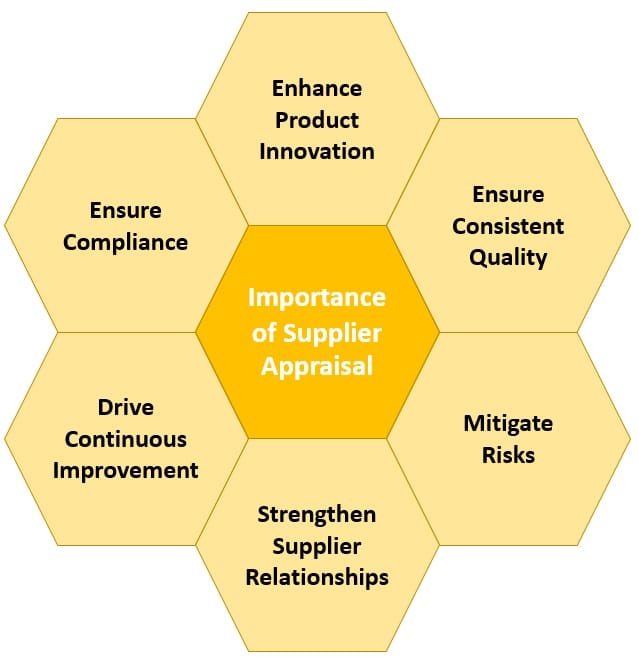The importance of a Supplier Appraisal plays a pivotal role in the intricate web of modern business operations. They provide the raw materials, components, and services that organizations need to create and deliver products or services to their customers. However, the reliability, quality, and performance of suppliers can significantly impact an organization’s own reputation and success. This is where the supplier appraisal process comes into play – a systematic method of evaluating and monitoring suppliers to ensure they meet predefined standards.
Ensuring Consistent Quality
The quality of your end product or service is directly influenced by the quality of the inputs you receive from your suppliers. By implementing a robust Importance of a Supplier Appraisal process, you establish a mechanism for evaluating the quality of the materials and components supplied. This process goes beyond initial sample checks; it involves ongoing assessments to ensure that the quality of supplied items remains consistent over time. Consistency in quality translates to reliability in your own production processes and the products you offer to customers.
Mitigating Risks and Ensuring Compliance
In today’s global business landscape, supply chains can be complex and geographically dispersed. This complexity brings along various risks – from delivery delays to regulatory non-compliance. The importance of a Supplier Appraisal process allows you to identify and assess potential risks associated with each supplier. By evaluating factors such as financial stability, production capacity, and adherence to industry regulations, you can proactively address risks and establish contingency plans. This not only helps in avoiding disruptions but also ensures that your organization operates within legal and ethical boundaries.
Driving Continuous Improvement
The importance of a Supplier Appraisal process is not just a one-sided evaluation; it’s an opportunity for collaboration and improvement. By sharing performance feedback and expectations with your suppliers, you create a dialogue that encourages them to enhance their processes and capabilities. A transparent appraisal process fosters an environment where suppliers are motivated to invest in their own improvement efforts, aligning their goals with your organization’s objectives. This synergy drives continuous improvement across the entire supply chain.
Strengthening Supplier Relationships
Healthy supplier relationships are built on mutual trust, communication, and transparency. A well-structured Importance of a Supplier Appraisal process facilitates open communication channels, allowing both parties to address concerns, share insights, and collaborate on solutions. Regular appraisals provide a platform to celebrate successes, identify areas for enhancement, and jointly set performance goals. As relationships strengthen, suppliers become strategic partners invested in your organization’s success.
Enhancing Product Innovation and Adaptability
Innovation is the lifeblood of sustained business growth. A comprehensive Importance of a Supplier Appraisal process can also serve as a source of innovation. By working closely with suppliers and understanding their capabilities, you might uncover opportunities for collaboration in product development and improvement. Suppliers often possess valuable insights into the latest trends, technologies, and market dynamics, enabling your organization to adapt and innovate more effectively.
Steps to Importance of a Supplier Appraisal Process
Define Evaluation Criteria: Determine the key parameters you’ll use to assess suppliers, such as quality, delivery performance, financial stability, and regulatory compliance.
Gather Data: Collect relevant data from various sources, including historical performance records, audits, and customer feedback.
Establish Metrics: Create measurable metrics for each evaluation criterion to ensure objectivity in the appraisal process.
Regular Assessment: Conduct periodic assessments of your suppliers based on the established criteria. Use a combination of quantitative data and qualitative insights.
Feedback and Improvement: Provide feedback to suppliers, highlighting areas of excellence and suggesting improvements. Encourage two-way communication for a collaborative approach to enhancement.
Performance Benchmarking: Compare supplier performance against industry standards to gain a broader perspective on their capabilities.
Supplier Development: Support suppliers in their improvement efforts by sharing best practices, providing resources, and facilitating training if necessary.
Conclusion
The supplier appraisal process is not just a checkbox on your quality management checklist; it’s a strategic imperative that can impact your organization’s competitiveness, risk management, and overall success. By assessing and nurturing your supplier relationships, you build a foundation of collaboration, innovation, and reliability. A well-implemented supplier appraisal process empowers your organization to proactively address challenges, seize opportunities, and create a resilient supply chain that drives excellence throughout your operations.

